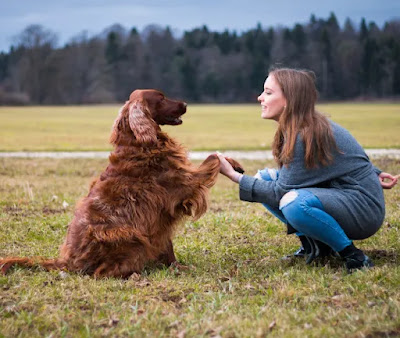Training your dog can be a rewarding experience for both you and
your furry friend. Here are some tips to get started:
1.
Choose a training method: There are many different training
methods and techniques to choose from. Some popular methods include positive
reinforcement, clicker training, and punishment-based training. It's important
to choose a method that aligns with your personal beliefs and values, and that
will be effective for your dog.
2.
Set goals: Determine what you want to accomplish through
training. Do you want to teach your dog basic obedience commands like
"sit," "stay," and "come"? Do you want to work on
specific behaviors like walking on a leash or house training? Setting clear
goals will help guide your training efforts.
3.
Find a trainer or training class: Consider working with a professional
trainer or enrolling in a training class. A trainer or class can provide
structure and guidance, and can help you learn how to effectively communicate
with your dog.
4.
Start with basic commands: Begin by teaching your dog basic
obedience commands like "sit," "stay," and
"come." These commands form the foundation for more advanced
training, and are essential for building a strong relationship with your dog.
5. Keep training sessions short and fun: Training should be a positive
experience for your dog. Keep training sessions short (5-15 minutes) and make
sure to end on a positive note. Use treats and praise to reward good behavior
and reinforce the behaviors you want to see.
6. Be consistent: Consistency is key when training your
dog. Use the same commands and cues every time you work with your dog, and be
consistent in your expectations and responses.
7.
Be patient: Training takes time and patience. Don't expect
your dog to learn everything overnight – be patient and keep working with them.
With consistent training and positive reinforcement, your dog will eventually
learn the behaviors you are teaching them.

Comments
Post a Comment